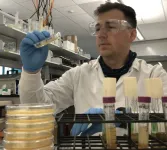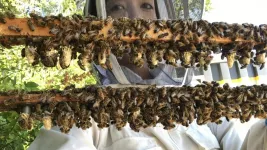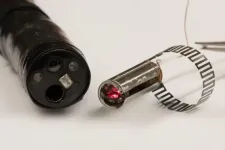(Press-News.org) Decades of research show that depression, stress, loneliness, and poor health behaviors can weaken the body's immune system and lower the effectiveness of certain vaccines. A new report accepted for publication in Perspectives on Psychological Science suggests that the same may be true for the new COVID-19 vaccines that are in development and the early stages of global distribution. Fortunately, it may be possible to reduce these negative effects with simple steps like exercise and sleep.
Vaccines are among the safest and most effective advances in medical history, protecting society from a wide range of otherwise devastating diseases, including smallpox and polio. The key to their success, however, is ensuring that a critical percentage of the population is effectively vaccinated to achieve so-called herd immunity.
Even though rigorous testing has shown that the COVID-19 vaccines approved for distribution in the United States are highly effective at producing a robust immune response, not everyone will immediately gain their full benefit. Environmental factors, as well as an individual's genetics and physical and mental health, can weaken the body's immune system, slowing the response to a vaccine.
This is particularly troubling as the novel coronavirus continues to rage across the world, trigging a concurrent mental health crisis as people deal with isolation, economic stressors, and uncertainty about the future. These challenges are the same factors that have been previously shown to weaken vaccine efficacy, particularly among the elderly.
"In addition to the physical toll of COVID-19, the pandemic has an equally troubling mental health component, causing anxiety and depression, among many other related problems. Emotional stressors like these can affect a person's immune system, impairing their ability to ward off infections," said Annelise Madison, a researcher at The Ohio State University and lead author on the paper. "Our new study sheds light on vaccine efficacy and how health behaviors and emotional stressors can alter the body's ability to develop an immune response. The trouble is that the pandemic in and of itself could be amplifying these risk factors."
Vaccines work by challenging the immune system. Within hours of a vaccination, there is an innate, general immune response on the cellular level as the body begins to recognize a potential biological threat. This frontline response by the immune system is eventually aided by the production of antibodies, which target specific pathogens. It is the continued production of antibodies that helps to determine how effective a vaccine is at conferring long-term protection.
"In our research, we focus most heavily on the antibody response, though it is just one facet of the adaptive immune system's response," said Janice Kiecolt-Glaser, director of the Institute for Behavioral Medicine Research at The Ohio State University and senior author on the paper.
The good news, according to the researchers, is that the COVID-19 vaccines already in circulation are approximately 95% effective. Even so, these psychological and behavioral factors can lengthen the amount of time it takes to develop immunity and can shorten the duration of immunity.
"The thing that excites me is that some of these factors are modifiable," said Kiecolt-Glaser. "It's possible to do some simple things to maximize the vaccine's initial effectiveness."
Based on prior research, one strategy the researchers suggest is to engage in vigorous exercise and get a good night's sleep in the 24 hours before vaccination so that your immune system is operating at peak performance. This may help ensure that the best and strongest immune response happens as quickly as possible.
"Prior research suggests that psychological and behavioral interventions can improve vaccine responsiveness. Even shorter-term interventions can be effective," said Madison. "Therefore, now is the time to identify those at risk for a poor immune response and intervene on these risk factors."
INFORMATION:
Reference: Madison, A. A., Shrout, M. R., Renna, M. E., Kiecolt-Glaser, J. K. (2021). Psychological and behavioral predictors of vaccine efficacy: Considerations for COVID-19. Advance: Social Sciences & Humanities.
Additional information in APS Research Topic on Vaccination.
Pulsed ultraviolet light can be an effective alternative to some of the antimicrobial technologies now used by the poultry industry to kill pathogens on eggshells, according to Penn State researchers, who simulated production conditions to test the technology.
Researcher Paul Patterson, professor of poultry science, College of Agricultural Sciences, suggests the technology has merit for commercial application in the egg industry.
"This study is unique because it scaled-up and applied components of standard egg processing to a conveyor and sanitizing eggs in a commercial setting," he said. "In the absence of water or other chemical sanitizers, this technology ...
Honey bee health has been on the decline for two decades, with U.S. and Canadian beekeepers now losing about 25 to 40% of their colonies annually. And queen bees are failing faster than they have in the past in their ability to reproduce. The reason has been a mystery, but researchers at North Carolina State University and the University of British Columbia are finding answers.
Their latest research, published Jan. 8 in the journal Communications Biology, offers clues about what's behind queen bee failure, finding that when sperm viability is low, the expression of a protein known to act against pathogens such as bacteria and viruses is high.
David Tarpy, a University Faculty Scholar and professor in NC State's Department ...
BOSTON -- Completing cancer screening tests, such as mammograms, can be challenging for low-income people, who may face such challenges as lack of transportation or inability to take time off work. A team at Massachusetts General Hospital (MGH) explored the possibility of addressing preventive care needs when patients are admitted to the hospital.
The pilot study, published in the Annals of Family Medicine, examined the feasibility of performing mammograms in women insured by Medicaid or both Medicaid and Medicare (dual-eligible patients) while they were hospitalized. "We designed the study to reach the patients who face significant barriers to completing their mammograms in the outpatient setting," says Andrew S. Hwang, MD, MPH, an internist at MGH and first author of ...
DES PLAINES, IL -- Among children who were not in an independently verified incident, evaluation for child abuse should be done by specialty consultation in children aged less than three-years old presenting with rib fractures and children aged less than 18-months presenting with humeral or femoral fractures. That is the conclusion of a study titled Identifying Maltreatment in Infants and Young Children Presenting with Fractures: Does Age Matter?, to be published in the January 2021 issue of Yersinia pestis (AEM), a journal of the Society for Academic Emergency Medicine (SAEM).
The lead author of the study is Ian ...
Since the dawn of the 21st century, there has been a rapid rise in the number of human immunodeficiency virus (HIV) infections in China, and today, the epidemic continues to grow. Several populations are victims of this virus, including injection drug users, sex workers, and men who have sex with men (MSM). In the various decades since HIV has gripped China, these groups and others have variously been at the forefront or background of national efforts to tackle the epidemic.
In the recent past, the prevalence of HIV has been high among the MSM population, particularly, MSM students. According to China CDC's national data on newly reported ...
(Boston) -- Minimally invasive surgeries in which surgeons gain access to internal tissues through natural orifices or small external excisions are common practice in medicine. They are performed for problems as diverse as delivering stents through catheters, treating abdominal complications, and performing transnasal operations at the skull base in patients with neurological conditions.
The ends of devices for such surgeries are highly flexible (or "articulated") to enable the visualization and specific manipulation of the surgical site in the target tissue. In the case of energy-delivering devices that allow surgeons to cut or dry (desiccate) tissues, and stop internal bleeds (coagulate) deep inside the body, a heat-generating energy source is ...
Earth's ability to absorb nearly a third of human-caused carbon emissions through plants could be halved within the next two decades at the current rate of warming, according to a new study in Science Advances by researchers at Northern Arizona University, the Woodwell Climate Research Center and the University of Waikato, New Zealand. Using more than two decades of data from measurement towers in every major biome across the globe, the team identified a critical temperature tipping point beyond which plants' ability to capture and store atmospheric carbon--a cumulative effect referred to as the "land carbon sink"--decreases as temperatures continue to rise.
The terrestrial biosphere--the activity of land plants and soil microbes--does much of Earth's "breathing," exchanging ...
Researchers from MBARI, the University of Hawai'i at Mānoa (UH Mānoa), and Woods Hole Oceanographic Institution, after years of development and testing, have successfully demonstrated that a fleet of autonomous robots can track and study a moving microbial community in an open-ocean eddy. The results of this research effort were recently published in Science Robotics.
Autonomous robotic fleets enable researchers to observe complex systems in ways that are otherwise impossible with purely ship-based or remote sensing techniques. In a time when the COVID-19 ...
Rising temperatures could trigger Earth's terrestrial ecosystems to transition from carbon sinks to carbon sources in the next 20 to 30 years, according to data from the world's largest continuous carbon monitoring network. The researchers suggest that up to half of land ecosystems could reach this tipping point - when plants begin to release carbon into the atmosphere faster than they sequester it - by 2100 under a business-as-usual emissions scenario. However, biomes that store the most carbon, including rainforests and Taiga forests, may lose more than 45% of their ...
A keen sense of smell is a powerful ability shared by many organisms. However, it has proven difficult to replicate by artificial means. Researchers combined biological and engineered elements to create what is known as a biohybrid component. Their volatile organic compound sensor can effectively detect odors in gaseous form. They hope to refine the concept for use in medical diagnosis and the detection of hazardous materials.
Electronic devices such as cameras, microphones and pressure sensors enable machines to sense and quantify their environments optically, acoustically and physically. Our sense of smell however, despite being one of nature's most primal senses, has proven very difficult ...





